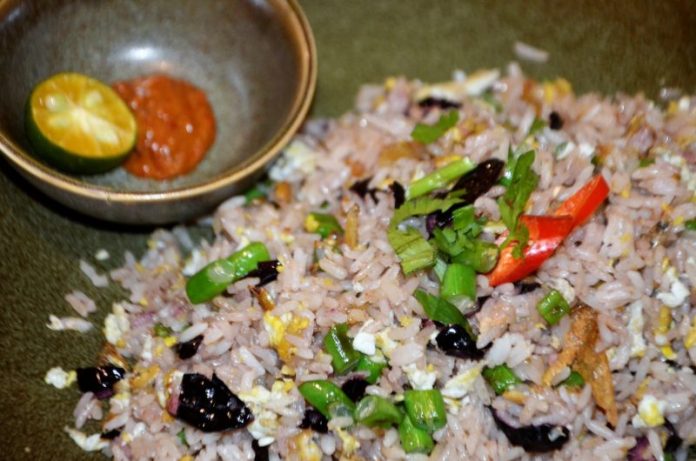
By Wilfred Pilo
PINGGAI CAFE, located at China Street in Kuching, offers a variety of delicacies for the universal taste but subtly influenced by Dayak culinary flavour.
The modern concept eatery, which opened last August, is managed by Iban sisters Ellis Sebai and Cynthia Rendong Banda, who wanted to test themselves in the food business.
“Our signature dishes are influenced by traditional Dayak flavour, which comes from Iban and Bidayuh culinary style of cooking. Dayak food is very subtle and honestly, very hard to cook, thus it is a challenge to acquire the exact taste,” Ellis said when met by DayakDaily.
“However, we help each other and bring the best of what we know and use the recipes that are commonly used in Dayak dishes. So far we have had very satisfying outcomes and have acquired the right taste but there is always room for improvement and we are willing to learn,” she added.


Ellis pointed out that spices and herbs used in Dayak cuisine can be found in any supermarket, while some from the wild are available in the local wet market that sells jungle produce.
“Usually, we use wild herbs and vegetables to get that extra punch in flavour .This is the basis of our cooking but sometimes some of these wild herbs and vegetable are seasonal and just cannot be obtained, so it is difficult at times.
“For this reason the taste is not as authentic but is acceptable when you add up other ingredients. In other words, the dishes become a familiar fusion of local flavours.”


Ellis highly recommended their signature dishes – cili padi ayam pansuh, mi goreng Dayak char siu, chicken curry served with glutinous rice in pitcher plant, tempoyak dabai fried rice and dragon fruit smoothie.
While taking a break for the interview and taking pictures in the cafe, a very familiar aroma came from the kitchen area.
“I am preparing the tempoyak dabai fried rice – our signature dishes here for you, just give me a few minutes,” said Ellis aloud, as her voice drowned by the clinking sound of the metal wok.
“The distinct smell of stir-fried tempoyak and dabai paste definitely will seize your tastebuds and make your stomach rumble. This is a must-have dish at Pinggai Cafe,” she continued.


Ellis explained that preserving food has become a culture among the natives, amid the rural jungle setting and lack of modern technology in the old days.
She cited tempoyak, made of fermented durian, and dabai paste, as popular delicacies of the Sarawak natives and have been consumed by the Iban and the Bidayuh communities for as long as anyone can remember.
Thanks to the Internet, she believed that many people are beginning to know more about Dayak food, particularly the widely known “lulun manuk” or pansuh ayam (chicken cooked in bamboo)
At Pinggai Cafe, Ellis and her sister pride themselves in preparing their dishes using methods passed down from generation to generation.
However, Pinggai Cafe is not just about Dayak food. It also offers a wide range of local and western delicacies.
“We serve gastronomical choices of food. Our coffee, for instance, we have expresso, cappucino including teas of various taste and a variety of soft drinks,” she continued.

Ellis recommended the smoked barbeque three-layered pork. At the cafe, she suggested patrons enjoy the meat with Pinggai’s signature tuak (rice wine) that is mixed with passion fruit tea.
“To me, this is as close as you can get to the merrymaking feeling during our Gawai (harvest) festival. We want our patrons to experience the almost perfect Dayak meal and we want to emulate such experience in Pinggai Cafe.”
Both sisters are very passionate in promoting Dayak food to another level and to be universally accepted.
“People say that Dayak food are easy to prepare but it is not. To acquire the authentic taste is difficult because the ingredients used can be very potent,” Ellis said.
The sisters hope to be competitive in the food industry and able to serve food reflecting Dayak culinary heritage. — DayakDaily








